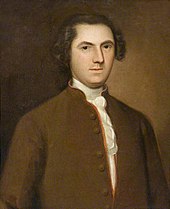Edward Hyde (politician)
Edward Hyde (* 1667 in Cheshire , England ; † September 8, 1712 in what later became Bertie County , Province of North Carolina ) was the first colonial governor of the British Province of North Carolina.
resume
Edward Hyde came from a prominent English family. He was a cousin of Anne Hyde (1637–1671), the first wife of the future King James II of England. He was related to their children, the queens Maria II and Anne . These family relationships helped him in his career. After losing both parents at the age of three, he grew up with one of his grandmothers. In 1683 he enrolled at the University of Oxford , but did not graduate from there. In 1702 he was appointed Provost Marshal for Jamaica by Queen Anne . He took over this office without being personally on site, i.e. in Jamaica.
In 1710 Hyde was named Deputy Colonial Governor for the northern part of the Province of Carolina . The area had been permanently settled for the first time ten years earlier, mainly by immigrants from the colonies of Virginia , New England and Bermuda . In the years 1708 to 1710 those responsible could not agree on elected representatives because of a dispute over the attempt to install an Anglican state church and the province was therefore without a recognized and legal government. In addition, war broke out with the Tuscarora . The inability of the Lords Proprietors to make necessary decisions led to the establishment of separate governments for the north and south . Since 1710 Hyde had to grapple with these problems. In addition, there was an ultimately unsuccessful rebellion led by Thomas Cary against Hyde in 1711 . The background was, besides personal tension, a religious conflict between the Quakers , who supported Cary and the Church of England , of which Hyde was a member. In 1712, the aforementioned separation of governments between North and South Carolina was completed and Hyde, the previous deputy governor for the north, was appointed the first British governor of the then newly formed Province of North Carolina. He held this office until his death as a result of yellow fever on September 8, 1712.
Web links
- Edward Hyde in the database of Find a Grave (English)
- Hyde in NCpedia
- Hyde at Carolana.Com
| personal data | |
|---|---|
| SURNAME | Hyde, Edward |
| BRIEF DESCRIPTION | British politician, Governor of the Province of North Carolina |
| DATE OF BIRTH | 1667 |
| PLACE OF BIRTH | Cheshire , England |
| DATE OF DEATH | September 8, 1712 |
| Place of death | Bertie County , North Carolina |
